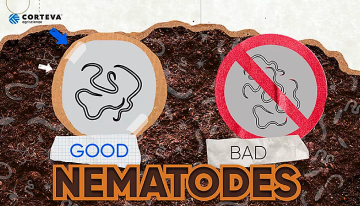
Maintaining vibrant soil is crucial for Indian farmers, providing a sustainable environment for crop growth. Understanding and managing soil health is a cornerstone of successful agriculture.
Soil health is the soil's capacity to function as a vital living system within ecosystem boundaries, sustaining plant and animal productivity, preserving water and air quality, and promoting overall plant and animal health.
Regardless of soil type, implementing sound agricultural practices enhances soil health. Conservation tillage, crop rotation, nutrient management, and cover crop usage are essential farming fundamentals.
Soil, a living and dynamic part of the farm, houses beneficial organisms like bacteria, fungi, protozoa, macro- and micro-arthropods, and nematodes. These contribute to nutrient cycling, natural disease and pest suppression, and soil structure improvement.
Nematodes are one of the most diverse and abundant groups of animals in the soil, and plants almost always interact with nematodes during their lifecycles.
Nematodes, a diverse and abundant group of soil animals, play a crucial role in nutrient cycles and plant growth. Beneficial nematodes, or "good" nematodes, contribute positively to soil biodiversity and health. They feed on bacteria, fungi, insects, and harmful nematodes, aiding in pest and disease suppression, fostering soil health.
Healthy soils rich in beneficial organisms enhance water and nutrient usage, suppress pests and diseases, and improve crop tolerance to environmental stresses, ultimately boosting long-term land productivity and farm profitability.
Plant-parasitic nematodes, or "bad" nematodes, are microscopic and destructive. Though invisible to the naked eye, they can cause significant crop damage and yield loss. Identifying them requires microscopic examination by a specialist.
Root-knot nematodes, a prevalent type, create knots or galls on crop roots, hindering water and nutrient uptake. Their feeding sites impair plant health, leading to visible crop destruction. These nematodes are responsible for substantial global crop losses.
Understanding the roles of beneficial nematodes is vital for optimising crop production and ensuring the farm's sustainability. Preserving beneficial nematodes while controlling harmful ones is crucial for crop health.
Root-knot nematodes are widespread and cause substantial annual crop losses globally. Protecting crops from these nematodes is essential for maintaining healthy soil and ensuring a good yield.
Using nematicides that target harmful nematodes while preserving beneficial ones supports soil productivity across agricultural cycles. This holistic approach contributes to current profitability and secures the farm's legacy for future generations.
Investing in soil health not only benefits today's crops but also ensures a sustainable and prosperous future for Indian agriculture.



























